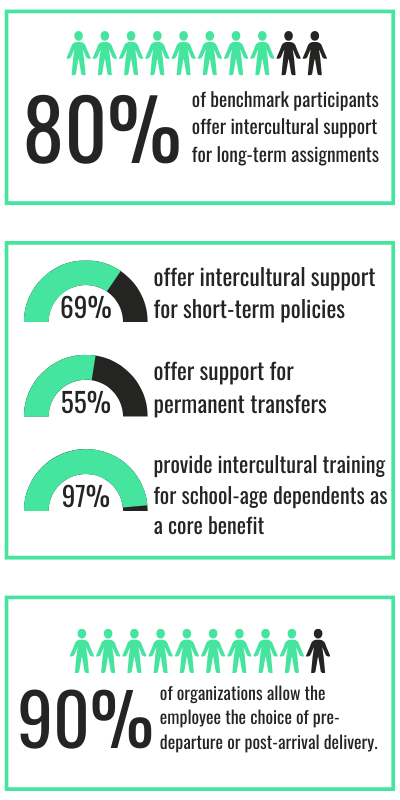Blog
BENCHMARK STUDY: BEST PRACTICES FOR INTERCULTURAL TRAINING
As the global business environment continues to evolve and grow more complex, organizations have come to value intercultural training as a critical tool for assignment success. Sirva conducted a benchmark study of more than three dozen organizations across various industry sectors to surface best practices and trends in intercultural training for globally mobile employees.
Our Intercultural Training Benchmark study provides an overview of the intercultural training benefits being offered by participating organizations as part of their global mobility policies. An overarching key finding of the study is that there is a growing recognition of the importance of intercultural training as a key contributor to the success of all assignment types, and this benefit will continue to serve as a component of global mobility policies.
Two key trends:
|
Long-Term Assignment Support

For long-term assignments, 80% of participants include some level of intercultural training as a standard provision of the policy, or as a core benefit in a Core-Flex policy. The remaining 20% of organizations offer intercultural training as an exception to policy or as part of the flex benefits options of a Core-Flex policy.
Short-Term and Permanent Transfer Assignment Support
Our study indicated that short-term assignment and permanent transfer policies are also receiving an increased level of attention when it comes to incorporating intercultural training into policies. A resounding 69% of clients offer intercultural support within their short-term policies, and 55% of clients offer intercultural support within their permanent transfer policies, a significant increase for this particular policy level. In our work with clients, we see these numbers continuing to grow as organizations review and adapt their policies.
Intercultural Support by Employee Level
While some level of intercultural training appears consistently across all employee levels, mobile employees in key leadership positions tend to receive additional benefits for intercultural training and coaching. Support for family members is typically included for all policy types and, for those organizations who provide intercultural training for the employee and spouse or partner, 97% also provide intercultural training for school-age dependents as a core benefit.
In-Person vs. Virtual Support
The question of whether to deliver instructor-led intercultural training live and in-person, or live virtually, was once a point of debate. However, the global pandemic necessitated virtual delivery and has gained widespread acceptance and, in some instances, there has been preference for this approach. All study participants allowed for training to be delivered either in-person or virtually, based on participant preference and local regulations. While we are starting to see more requests for in-person delivery post-COVID, the future of virtual delivery clearly remains strong.
Offering employees and their families the flexibility to take training when and where it works best for them is also on the rise, with 90% of the participating organizations granting the employee the choice of pre-departure or post-arrival delivery.
Increased Focus on DEI Content
Another positive step in the evolution of intercultural training is that organizations are increasingly focused on incorporating specific Diversity, Equity, and Inclusion-focused content into their intercultural training programs.
In a complex and evolving global environment, with equally complex assignment goals, our benchmark study shows that organizations have come to value intercultural training as a critical tool in recruiting employees for international assignments, demonstrating duty of care for employees before and during an assignment, and preparing globally mobile employees for assignment success.
For more information on this benchmark study and how Sirva can help you develop an effective intercultural training policy, please email us at concierge@sirva.com or reach out to your Sirva representative.

